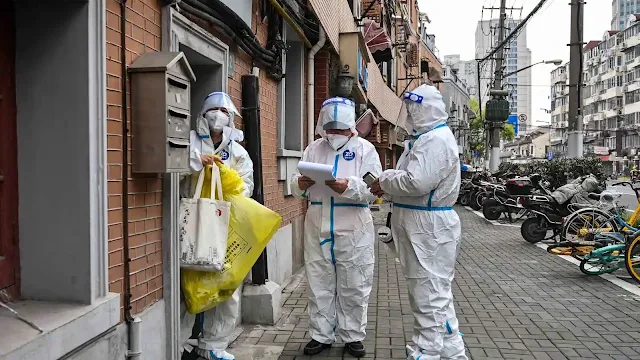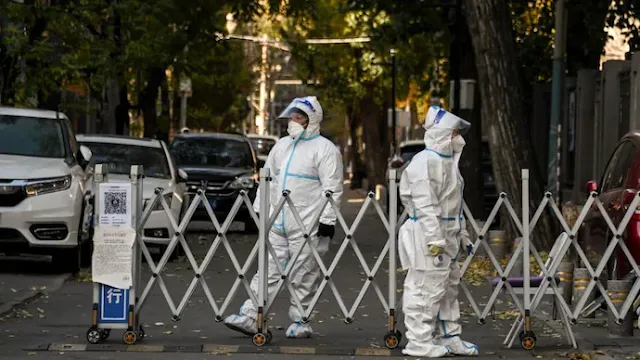China's top health officials have pledged to rectify COVID-19 control measures to reduce their impact on people's lives, while deflecting blame for public frustration away from the policy itself.
China's top health officials are defending their controversial policy amid mounting criticism over their handling of the COVID-19 pandemic. The officials have come under fire for their decision to allow millions of people to travel during the Lunar New Year holiday, which is believed to have contributed to the spread of the virus. They have also been criticized for their initial response to the outbreak, which was widely criticized as being delayed and secretive.
The comments came in their first press briefing since protests erupted against the government's stringent zero-COVID policy over the weekend.
After outbreaks occur, it is crucial to lift lockdowns as quickly as possible, said National Health Commission officials at a press briefing in Beijing on Tuesday. They justified the country's policy direction - which is aimed at preventing the spread of the virus through strict controls - by saying that it is necessary to protect public health.
Cheng Youquan, a director at the China Centre for Disease Control and Prevention, said "some issues" reported recently by the public are not due to the measures, but their application by local officials taking a "one-size-fits-all approach." He said some controls had been implemented "excessively", with disregard for the people's demands.
Protests against the country's zero-COVID policy, which includes a combination of lockdowns, forced quarantines and tight border controls, flared across China over the weekend, with citizens taking to city streets and college campuses to call for an end to the restrictive measures.
While protests in several parts of China appear to have largely dispersed peacefully over the weekend, some met a stronger response from authorities - and security has been tightened across cities
Officials at Tuesday's press briefing did not directly address the protests but commission spokesperson Mi Feng said governments should "respond to and resolve the reasonable demands of the masses" in a timely manner.
When asked if the government is reconsidering its COVID-19 policies, Mi said authorities "have been studying and adjusting our pandemic containment measures to protect the people's interest to the largest extent and limit the impact on people as much as possible".
Earlier this month, China announced 20 measures to streamline COVID-19 controls and reign in "excessive policy steps" taken by local authorities. These measures come as a response to pressure from Beijing to control the number of cases in their regions.
The protests - and the pledges to refine the policy implementation - come as the country faces its most significant surge of cases.
China identified 38,421 locally transmitted cases on Monday, according to the National Health Commission, ending six consecutive days of record infections.
Low vaccination rates among the elderly have long been cited by authorities as a reason why China must maintain tight controls over the virus. On Tuesday, officials also announced an "action plan" to boost vaccination rates among this high-risk group.
Raising that rate is seen as necessary to eventually reopening the country and relaxing tough measures.
As of November 28, about 90 per cent of China's total population had received two doses of a COVID-19 vaccination, but only roughly 66 per cent of people over 80 had completed two doses, officials said on Tuesday.
Many people were dissatisfied with the officials' statements on Chinese social media. They felt that the officials had not done enough to assuage their frustration and anger over the zero-COVID policy. On a state media livestream of the press conference, many users called for an end to COVID testing and centralised quarantine.
"We've cooperated with you for three years, now it's time to give our freedom back," said one top comment on the livestream, which was run by state media on the Weibo social media platform.
"Can you stop filtering our comments? Listen to the people, the sky won't fall," wrote another, referring to censorship on the platform.
In a separate briefing on Tuesday, China's Foreign Ministry defended the COVID-19 control measures and civil rights in the country.
"China is a country under the rule of law, Chinese citizens enjoy various legal rights and freedoms that are fully protected by law," spokesperson Zhao Lijian said, when asked about the protests in a regular briefing on Tuesday.
"At the same time, any rights and freedoms should be exercised within the framework of the law."
Asian shares rose on Tuesday as investors grew hopeful that authorities had contained the protests and that the health commission would soon announce an easing of COVID restrictions.














0 Comments:
Post a Comment